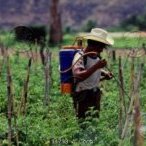English · Español

4 May 2017 | News | Water | Agroecology | Resisting neoliberalism | Human rights | Food Sovereignty
UN Rapporteurs recommend hazardous pesticide ban
Download: MP3 (7.4 Mb)
On March 8th, UN Special Rapporteur on the right to food, Hilal Elver and UN Special Rapporteur on human rights and the environment, John Knox, submitted to the UN Human Rights Council a report that discusses the danger pesticides pose for human health and the environment. In the report, they recommend banning hazardous pesticides and promote agroecology.
"(...) Pesticides are responsible for an estimated 200,000 acute poisoning deaths each year, 99 per cent of which occur in developing countries, where health, safety and environmental regulations are weaker and less strictly applied", states the report. It adds that it is usually argued that industrial farming needs agrochemicals to respond to the global food demand, but they warn that "this has come at the expense of human health and the environment" and that "increased food production has not succeeded in eliminating hunger worldwide". The rapporteurs also state that "reliance on hazardous pesticides is a short-term solution" because, in addition to polluting ecosystems they reduce pest populations, among them natural predators that keep a balance in the ecosystem, and undermine biological diversity.
They state that "while scientific research confirms the adverse effects of pesticides" it is a challenge to prove the damage and add that "this challenge has been exacerbated by a systematic denial, fueled by the pesticide and agroindustry, of the magnitude of the damage inflicted by these chemicals, and aggressive, unethical marketing tactics remain unchallenged".
Health and environmental impacts
“Few people are untouched by pesticide exposure. They may be exposed through food, water, air, or direct contact with pesticides or residues", they add. And they make reference to extreme cases of tens of schoolchildren dying in India in 2013, China 2014 and Bangladesh 2015 for consuming food products contaminated with pesticides. They also warn about chronic exposure and the links to diseases such as cancer, Alzheimer´s and Parkinson´s, hormone disruption, developmental and neurological disorders, in addition to breathing problems and allergies. They state that the potential effects on the health are not studied, or what happens to a person exposed through food, water, soil or air. In addition to effects on workers, they point to the especially vulnerable situation of children engaged in agricultural work, seasonal and migrant workers and communities living near agricultural lands where pesticides are applied. Among those affected, they highlight indigenous communities: "traditional food sources of indigenous peoples are regularly found to contain high levels of pesticides", pregnant women and children, who are more exposed because their organs are under development and because of their body weight they are exposed to higher doses.
"High cumulative exposure of consumers to pesticides is particularly worrying, especially with lipophilic pesticides, which bind with fats and bioaccumulate in the body", highlight Elver and Knox, who add that a "cocktail" of pesticides is found in food. To get rid of them, it is not enough to wash and cook food, because "many pesticides used today are systemic — taken up through the roots and distributed throughout the plant". The rapporteurs also make reference to their concern for the bioaccumulation of pesticides in farm animals and basic food for children, such as milk, and the contamination of water.
In addition to the destruction of soil and water, the report states that neonicotinoids (systemic insecticides) are accused of being responsible for “colony collapse disorder” of bees worldwide. With reference to genetically modified crops, the rapporteurs state that "proponents of systemic pesticides and genetically engineered crops claim that by eliminating liquid spraying, the risk of exposure to farm workers and other non-target organisms is greatly reduced. However, further studies of chronic exposure are needed to determine the extent of the impact of systemic pesticides and genetically engineered crops on human health, beneficial insects, soil ecosystems and aquatic life". They also remind that the World Health Organization (WHO) announced in 2015 that glyphosate is a "probable carcinogen". As far as GMOs, they state that in Europe the regulations exemplify the precautionary principle, but they regret that this is not the case in the US, the largest GM crop producer.
Strategies and Recommendations
The report establishes that “the oligopoly of the chemical industry has enormous power", and that "recent mergers have resulted in just three powerful corporations: Monsanto and Bayer, Dow and Dupont, and Syngenta and ChemChina, who control more than 65 per cent of global pesticide sales" and 61 per cent of commercial seed sales. They make reference to the pressure exerted by the pesticide industry on governments, scientists and the "revolving door" phenomenon with "employees shifting between regulatory agencies and the pesticide industry".
With reference to the legal framework, the rapporteurs state that while there is no shortage of international and national legislation, as well as non-binding guidelines, such instruments "are failing to protect humans and the environment from hazardous pesticides". This is why they recommend a "broad and binding" treaty that regulates dangerous pesticides throughout their life cycle. They propose the progressive elimination of highly dangerous pesticides, but they understand that the "most effective, long-term method to reduce exposure to these toxic chemicals is to move away from industrial agriculture". Thus, they encourage the promotion of agroecology that replaces the use of chemical products with biological products. They make reference to studies that point out to the fact that agroecology is capable of producing sufficient yields to feed the entire global population, protecting human health and the environment, in addition to securing the livelihoods of smallholder farmers.







